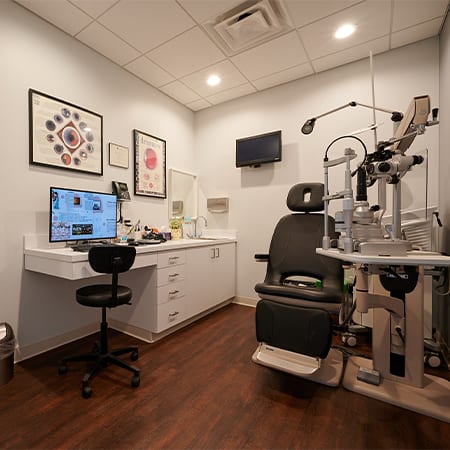Colorado’s doctors of optometry are clearing up 10 common myths about vision and eye health that could be negatively impacting your health. Understanding your eye health is key for preserving vision and comprehensive eye exams are your best chance at early detection of eye health issues and over 270 other health conditions.
Myth 1: Dry/scratchy/red eyes are just part of living in Colorado since we live in an arid climate
Colorado’s climate easily accelerates the evaporation of tears that we produce and can contribute to dry eye disease, but the actual cause of producing fewer tears is unknown. Dry eyes can also be influenced by hormonal changes, some medications, other illness/disease and aging. However, dry eyes and dry eye disease are treatable and preventable even in Colorado. If you have dry, scratchy, gritty, and/or red eyes from time to time a lubricating eye drop can provide relief. If you experience dry eyes more frequently or are experiencing increasing discomfort then getting an eye exam with your optometrist is recommended to fully understand and address your symptoms.
Myth 2: Not everyone gets cataracts
Actually, everyone is prone to cataracts if they live long enough and most cataracts are age-related. More than half of Americans over the age of 80 have experienced cataracts and your risk for cataracts increases after age 40. Stave off the onset of cataracts by not smoking/vaping tobacco, limit alcohol, reduce UVA/B exposure by wearing sunglasses and a hat, and eat a balanced diet with leafy greens, berries, and nuts.
Myth 3: An eye exam is only needed if I am having a vision problem
This is not true. Many eye health challenges can be present without symptoms, but these eye conditions can be quietly progressing until an individual’s vision is threatened and symptoms arise. To put this in perspective, 80% of all retinal disease is asymptomatic. Your eye health plan should include annual comprehensive eye exams for early detection and management of eye health diseases and conditions. A comprehensive eye exam looks at more than just vision acuity and can uncover over 270 other health conditions that other exams can’t detect like some cancers, many auto immune diseases, hypertension, stroke risk and more.
Myth 4: If you cross your eyes they will stay that way
This is simply not true. Misalignment of the eyes is called Strabismus and is typically due to an underlying health condition. Strabismus can be corrected with glasses and/or surgery and does not occur from simply crossing your eyes.
Myth 5: If I eat more carrots my eyes will get better
While carrots hold great nutrients for your eyes, they are best used in a balanced diet to prevent eye health issues and do not aid in correcting existing vision or eye health issues. In fact, when it comes to eye health prevention is key because most eye health and vision issues can only be managed/corrected and not cured once they are present.
Myth 6: If you wear glasses your eyes will get worse
Your eyes change due to genetics, outside influences like computer use etc, not from seeing clearly. Some individuals feel that their vision is worse when they take off their glasses. What happens in these cases is that the glasses are working well to correct your vision and when you take the glasses off your brain is telling you that it likes the help of glasses. Remember that your brain plays a large part in your vision too.
Myth 7: If you don’t wear glasses your eyes get worse
Your eyes change due to genetics, outside influences like computer use etc, not from seeing blurry. Not wearing glasses or contacts leads to eye strain from not seeing clearly.
Myth 8: If I wait to get reading glasses in my 40’s I will keep my eyes stronger longer
This theory only creates eye strain and eye fatigue. Age-related vision changes like the changes that occur after age 40, are due to the lens in your eye losing elasticity as you age. These vision changes are not due to a muscle that is losing tone.
Myth 9: Contact lenses can get lost in your eye or go into your brain
There is no way for contacts to get lost in your eye. They can be hard to find, but they are there.
Myth 10: I can’t wear contacts because I have an astigmatism
Astigmatism occurs in 90% of the population and it is dealt with as easily as nearsightedness. Most people can be fit with contact lenses, but you can also correct an astigmatism with glasses or laser eye surgery.




















